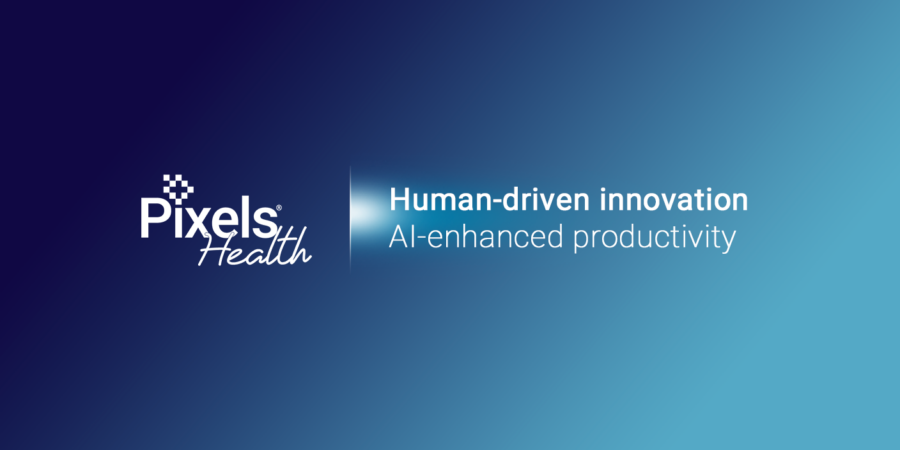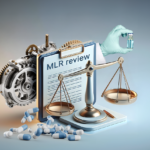Revolutionizing Scientific Production with Sovereign AI and Human Expertise
Revolutionizing Scientific Production with Sovereign AI and Human Expertise
Imagine a pharmaceutical company that is using sovereign AI and generative artificial intelligence, can design a marketing campaign in record time, create precise 3D animations of complex biological processes, or write customized scientific reports, all while reducing production costs. This scenario is now a definite reality in the pharmaceutical industry. Generative AI technologies are revolutionizing how pharmaceutical companies and communications agencies produce content aimed at healthcare professionals or the general public.
However, the integration of sovereign AI makes this revolution even more impactful in the pharma sector. Thanks to sovereign AI, laboratories can maintain total control over their data, ensuring maximum data security and compliance with strict standards, such as the RGPD in Europe. Sovereign AI thus offers a crucial advantage for the management of sensitive data.
Benefits of Sovereign AI in Content Creation
Sovereign AI is a form of artificial intelligence designed to operate independently within an organization’s controlled infrastructure, ensuring that sensitive data is not shared with or exploited by third parties. This approach is becoming essential in highly regulated sectors, where data confidentiality and compliance are top priorities. Find out how sovereign AI and generative AI can transform your scientific output and guarantee the security of your data.
3D Animation
One of the most promising applications of generative AI in the pharmaceutical sector concerns the creation of medical animations and 3D images. These technologies enable complex biological processes to be represented visually, with detail and precision. Take AstraZeneca, for example, which has adopted advanced imaging technologies, notably 3D animations, to enhance its scientific communication and marketing efforts. One notable illustration is the use of 3D models and animations to explain the mechanism of action of its drugs, particularly in the fields of oncology and immunotherapy.
Their 3D visualizations have been used to show how targeted therapies and immunotherapies interact with cancer cells and the immune system. These visual tools help healthcare professionals, researchers, and even patients to better understand how these therapies attack cancer cells while sparing healthy cells.
Promotional content at the speed of light
Customizing marketing and promotional content has always been a challenge in the pharmaceutical sector. Thanks to generative AI, it is now possible to produce tailor-made communication campaigns on a large scale. For example, OpenAI’s GPT-4 algorithm is capable of generating promotional and sales content such as e-mailings, product leaflets, and content for social networks, by adjusting messages, language, and format, and adapting to different market segments.
The main advantage of generative AI in this context is its ability to produce content quickly and accurately while respecting regulatory compliance constraints. By ensuring that each message is optimized for its specific audience, pharmaceutical companies can create far more engaging marketing campaigns, whether explaining the benefits of a drug to doctors or providing educational information to patients. A study by McKinsey & Company shows that companies that have adopted generative AI in their content production operations have experienced a 20-30% increase in overall productivity.
While generative AI can speed up content production, human expertise remains essential to guarantee scientific and ethical rigor. Researchers and experts must supervise the content produced by AI, validating each stage of scientific production to ensure that reports and analyses meet the highest scientific standards. For example, although AI can generate clinical trial summaries, human experts play a crucial role in verifying and adjusting conclusions.
Scenarios and Creative Concept Development
Generative AI is playing an increasingly vital role in the creation of omnichannel campaigns, enabling pharmaceutical communications agencies to produce creative scenarios integrating multiple delivery channels. This technology could use AI to create storytelling around the launch of a new drug with specific messages tailored to various audiences (doctors, pharmacists, patients) to optimize the impact on each target audience. Thanks to AI, an omnichannel campaign can be fully adapted to meet the needs of each market segment by analyzing data from a variety of sources, such as healthcare professionals’ preferences, patient feedback, and market trends. Based on this information, generative AI can produce specific storytelling on a particular treatment, with details tailored to the relevant medical specialties.
Drew Panayiotou, Global Chief Marketing Officer de Pfizer, explains how Pfizer’s new AI platform has improved the company’s marketing: “This innovative platform is designed to accelerate collaboration, ideation, and campaign development between Pfizer and their agency partners around the globe. In a world of rapidly fragmenting media and audience attention, tools like this can help increase the speed of execution and creative exploration to penetrate critical cultural moments that influence behaviors impacting individual health.”
Sovereign AI is not only revolutionizing marketing campaigns. It also plays a key role in scientific production. It can analyze massive volumes of clinical data and generate scientific reports in a matter of hours, whereas this would have taken weeks with traditional methods. By automating tasks such as creating clinical trial protocols or 3D modeling of trial results, sovereign AI enables researchers to concentrate on interpreting and analyzing critical data.
Safety and Compliance in Scientific Production
In the pharmaceutical industry, scientific data must be treated with the highest precision, especially when submitted to regulators such as the FDA or the EMA. Sovereign AI ensures that this information remains secure and compliant with international regulations while speeding up the submission process. Thanks to this technology, pharmaceutical companies can handle large volumes of sensitive data with complete confidence.
Read more: 9 Ways AI Can Help Pharma Marketers
Why Pharma Groups and Communication Agencies are Favouring Generative AI and Sovereign AI?
The adoption of generative AI and sovereign AI technologies in the pharmaceutical sector marks a real turning point in terms of efficiency and innovation. By replacing traditional methods of content creation, these technologies bring tangible benefits that revolutionize current practices. Whether it’s speeding up the production of promotional material, improving the quality of scientific visuals, or personalizing interactions with healthcare professionals, generative AI is transforming every stage of the marketing process. Here are the main benefits observed in the sector:
Reduced production time
The integration of generative AI and sovereign AI tools has dramatically accelerated the content creation process in the pharmaceutical industry. What used to take several weeks, such as designing a complex 3D animation or setting up a fully personalized marketing campaign, can now be achieved in a matter of days, or even hours. This accelerated process enables pharmaceutical companies to respond more quickly to market demands and to launch campaigns more frequently in a better targeting way. According to a study by Accenture, the use of generative AI in content creation has reduced production times by up to 60% in several sectors. This time-saving enables teams to focus on more strategic aspects of brand and product development, freeing them from repetitive tasks.
Improved Visual Quality and Accuracy
Generative AI and Sovereign AI have revolutionized the quality of images and animations, offering precision and realism that are unrivaled and crucial to ensuring the scientific and medical credibility of the content. These visuals, which combine complex detail with high fidelity, have become essential tools in both commercial and scientific communications. They enable complex biological or pharmaceutical concepts to be represented in an intelligible and convincing way, enhancing the understanding and confidence of healthcare professionals, regulators, and the general public.
These AI tools are also used in commercial contexts. Pharmaceutical companies’ marketing teams exploit these animations to visually present complex data to healthcare professionals, such as clinical studies or mechanisms of action for new treatments. Regulators, such as the FDA or the EMA, also benefit from these visuals to assess the safety and efficacy of proposed treatments. By simplifying and making accessible complex medical concepts, these visuals increase transparency and improve decision-making processes.
Creativity and flexibility
Generative AI tools offer pharmaceutical groups and communications agencies a new kind of flexibility to push back the boundaries of creativity. By freeing themselves from the traditional constraints of time and budget, the teams can experiment and develop innovative concepts much more rapidly. This technology makes it possible to test bold ideas while ensuring their viability through real-time adjustments. Generative AI also stimulates teams’ creativity by enabling them to propose concepts that would otherwise be deemed too risky or too costly to test. This strengthens collaboration between departments, allowing them to review and refine concepts in real-time, creating an environment conducive to continuous innovation.
A case in point is AstraZeneca, which has used AI to improve the flexibility and creativity of its marketing campaigns for cancer treatment Tagrisso. By integrating AI algorithms into its creative processes, AstraZeneca was able to generate several scenarios tailored to different market segments, including doctors, patients, and regulators. This enabled them to quickly test several versions of the campaign and adjust messages according to feedback from different audiences.
Optimizing marketing and production budgets
Content production using generative AI is not only faster, but also more cost-effective. The costs of creating visuals, animations, and text content are drastically reduced, enabling pharmaceutical companies to allocate their budgets more effectively. According to a McKinsey study, companies that adopt AI to automate content creation can reduce their overall production costs by up to 30%. This reduction can be explained by several factors, including the automation of repetitive tasks, shorter times to creation, and less number of reworks.
Read Article : How implementation unlocks the true potential of AI in pharma
Generative AI and sovereign AI, in association with human expertise, are set to profoundly redefine scientific production. But this technological revolution raises an essential question: how far can we push this automation without sacrificing the rigor and ethics that underpin scientific research? While AI offers speed and efficiency, it cannot guarantee on its own that results will be interpreted with the necessary discernment. This is where human expertise comes in.
Far from replacing researchers and experts, these new technologies act as powerful tools, capable of processing immense quantities of data, speeding up processes, and reducing costs. Human experts, meanwhile, remain the guardians of scientific quality, checking that every piece of data, every report, and every visualization complies with the strictest scientific and ethical standards.

